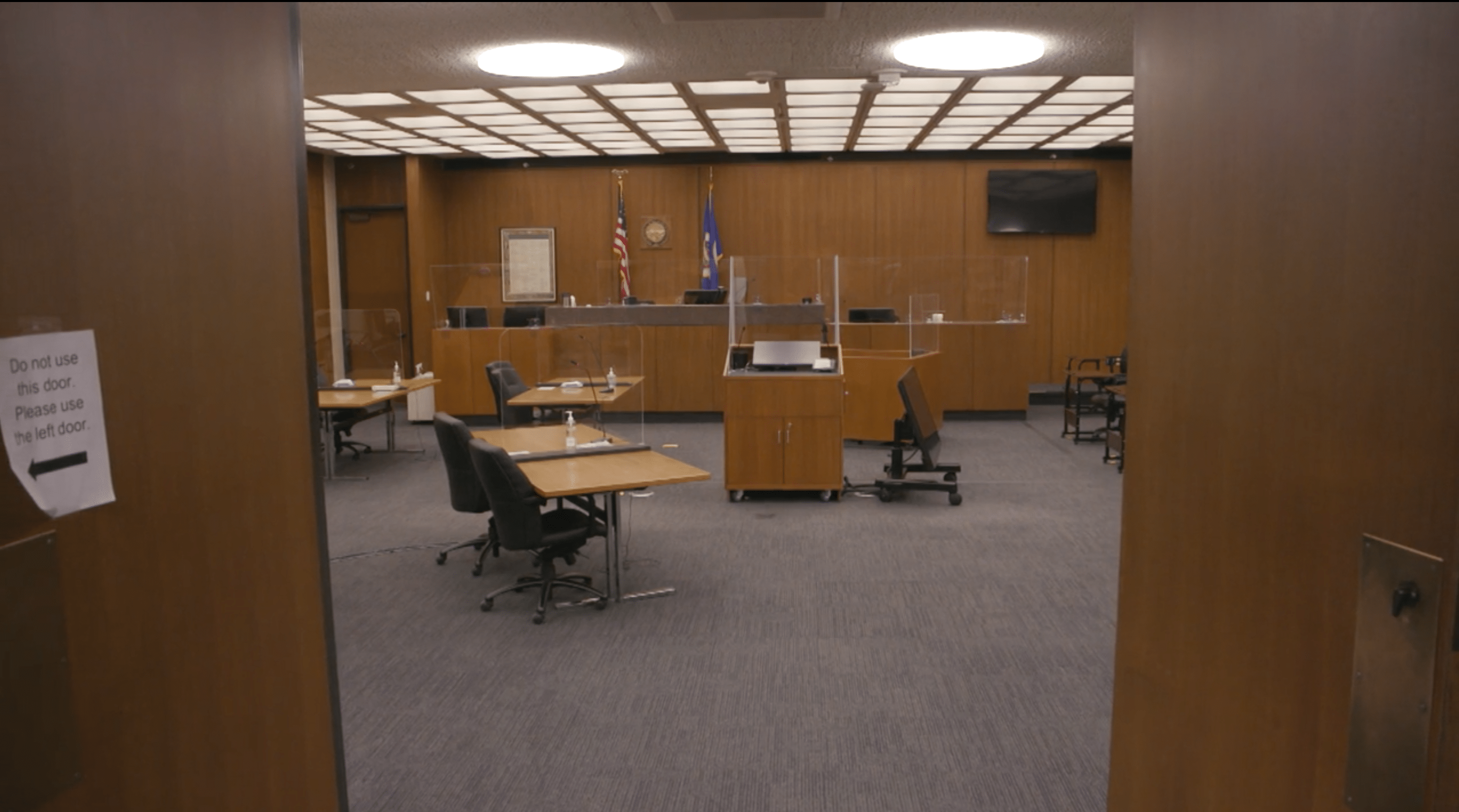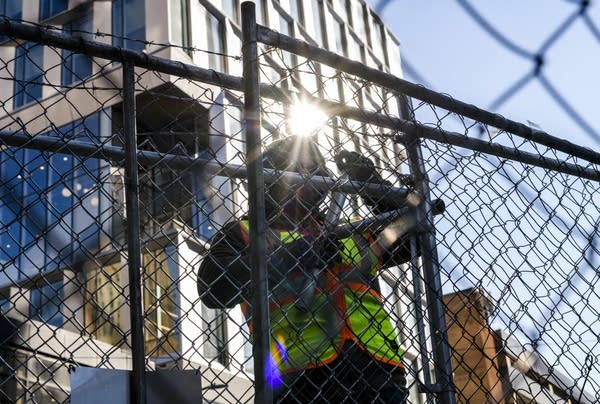Chauvin trial: 7th juror seated; Mpls. to pay $27M to settle Floyd family lawsuit
Friday's court proceedings have ended for the day

Go Deeper.
Create an account or log in to save stories.
Like this?
Thanks for liking this story! We have added it to a list of your favorite stories.
MPR News will stream live coverage of the trial on Facebook beginning at 8 a.m. Monday. Some images or material discussed during the trial will be disturbing to many viewers. Watch the Friday morning proceedings here. Watch the afternoon proceedings here.
3 things to know:
Minneapolis City Council agrees to $27 million civil settlement with George Floyd’s family
7 chosen so far for a jury of 12, plus two alternates
Prosecutors see race at play as defense rejects some prospective jurors; judge sees “no pattern”
Updated: 3:26 p.m.
As jury selection continued Friday in the trial of ex-Minneapolis police officer Derek Chauvin, the City Council unanimously passed a $27 million settlement in the killing of George Floyd.
Until now, the largest misconduct payout in state history was the $20 million settlement in 2019 for the killing of Justine Ruszczyk, who was shot and killed by former Minneapolis police officer Mohamed Noor after she called 911.
As part of Friday's settlement, $500,000 will go toward the community around 38th Street and Chicago Avenue, where Chauvin knelt on Floyd's neck for about nine minutes as he struggled to breathe. Chauvin is charged with murder and manslaughter.
Turn Up Your Support
MPR News helps you turn down the noise and build shared understanding. Turn up your support for this public resource and keep trusted journalism accessible to all.
Attorneys in Chauvin’s case have grilled potential jurors about what they know of Floyd’s killing and the aftermath. Former Hennepin County chief public defender Mary Moriarty, who is not involved with the case, said the judge wants to make sure people who are seated on the jury can make a fair decision based on the evidence. But it may be difficult for jurors to avoid the news of a record-breaking civil settlement.
“The problem with the settlement timing is that I think $27 million sends a huge message about what the city thinks of Chauvin’s behavior," Moriarty said. "If the jury becomes aware of that, what role might that play in their decision?”
Jury selection began Tuesday; opening statements are expected March 29.
Jury selection slow going on Friday
Proceedings got off to a slower than usual pace Friday but shortly after the lunch break, a seventh juror was selected for the panel of 12, plus two alternates. The jury so far is comprised of five men and two women.
The latest addition to the jury described herself as the single mother of two teenage boys. The court held part of her questioning without audio while they discussed a sensitive matter with the juror. She later said in her work for a nonprofit advocacy group, she’s had contact with Attorney General Keith Ellison.
When asked if she felt that would jeopardize her ability to be an impartial juror, she said no.
Defense attorney Eric Nelson asked the juror about her answers on the jury questionnaire pertaining to the treatment of people of color by the criminal justice system.
“I do believe there’s bias,” said the woman, who identifies as white and is in her 50s, according to information provided by the court. “I’ve seen it in my work.”
The woman also said had formed a somewhat negative opinion of Chauvin. But she said she had sympathy and empathy, not only for Floyd, but for the officers involved.
“Everyone’s lives are changed by this incident and what happened. Everyone’s lives,” she said. “And it’s not easy. For anyone.”
Another woman, who described herself as a recent college graduate, was dismissed by the defense team after questioning.
During the inquiry the woman said she had a “somewhat negative” impression of Chauvin after seeing the bystander video.
“I could only watch part of the video,” she said. “From what I saw as a human — that didn’t give me a good impression.”
The woman also said she favored police reform and said she had friends of color who’d been treated unfairly by police.
Nelson used his eighth peremptory strike to keep her off the jury.
Meanwhile, the state used its fifth strike on another potential juror, a man who said he had eight years of experience in the Army Reserve and served in Iraq. He said he had a neutral opinion of Chauvin because it was a high-stress situation.
“Having been in the military, it’s easy for bystanders to say how they would handle a situation. It’s completely different when you’re in it for real,” he said.
Race, ethnicity questions bubble in jury selection
Prosecutors this week have raised questions of bias in several decisions by Chauvin’s defense attorneys to dismiss prospective jurors of color.
It became enough of an issue on Thursday that Judge Peter Cahill described the race and ethnicity of the six anonymous jurors selected by that time — three white men, a Hispanic man, a Black man who is an immigrant and a woman who identifies as multiracial — after the defense eliminated a man from the jury pool who identified himself in jury records as Hispanic.
That prospective juror had said bystander video of Chauvin kneeling on Floyd’s neck made him feel like the police were behaving like an "occupying force" and that it reminded him of images of World War II.
Prosecutors argued the exclusion was race-based. Cahill said he saw “no pattern whatsoever from the defense of striking racial minorities.”
Race, though, remains a constant as lawyers work to pick 12 jurors and two alternates to review the evidence against Chauvin.
“We need people of color on the jury. We need Black elders on the jury,” said civil rights attorney and activist Nekima Levy Armstrong, who’s not involved in the case but is keeping a close eye on the jury's racial makeup.
“We need people who have a history of understanding of the context of what’s happening in this country, and how what happened to George Floyd is a perpetuation of the lynchings Black people experienced, time and time again,” she added.
3rd-degree murder charge returns
On Thursday, Cahill reinstated third-degree murder charges against Chauvin.
The Hennepin County judge acknowledged he was bound by a Minnesota Court of Appeals decision in a separate case involving Noor. The higher court had denied Noor's appeal of his third-degree murder conviction, saying it was an appropriate charge in that case.
Cahill initially disagreed with the Noor opinion and denied the prosecution's request to add back third-degree murder. The defense has argued the charge doesn't apply because Chauvin's action was directed at a single person, rather than multiple people.
"When intent is directed at a single person — this is a legal principle that they've established now — then third-degree may apply,” Cahill told the court Thursday morning. “Single acts directed at a single person fall within the gamut of murder in the third-degree."

Chauvin also faces charges of second-degree unintentional murder and second-degree manslaughter in Floyd’s killing.
MPR News reporter Matt Sepic contributed to this report.
Trial basics

Who’s who: A look at the key players in the trial.
Need to know: 14 key questions about the trial, answered.
Jury selection: The complex process to pick jurors who will weigh charges fairly.
MPR News on its coverage: Ahead of Chauvin’s trial, Nancy Lebens, the newsroom’s deputy managing editor, answered audience questions about our reporting plans.
George Floyd and his legacy

Remembering George Floyd, the man: Before he became a symbol in the fight for racial justice, friends say Floyd was a “gentle giant” who sought a fresh start.
Making George Floyd Square: Here’s how the site of Floyd’s killing — 38th Street and Chicago Avenue in Minneapolis — is being reshaped.
Calls for change: Here’s what some Floyd activists tell MPR News about their experiences with race in Minnesota, why they march and what they hope for the future.
Read more

Minneapolis council OKs $27M Floyd family settlement: It’s a record settlement amount for the city.
Your questions about the Chauvin trial, answered: Why are potential jurors asked about religion, who can dismiss them and why can the jury hear about Derek Chauvin’s past but not George Floyd’s?
Activist and Christian hip-hop artist remembers his friend, George Floyd: NPR's Ari Shapiro speaks with Ronnie Lillard as the trial of former officer Derek Chauvin continues. (NPR)
Possibility of an unpopular verdict makes some in jury pool nervous: Several people have said they fear retribution if they were to render an unpopular verdict. (NPR)
What would 'Justice for George Floyd' look like? Sahan Journal invited four diverse community members to this discussion. (Sahan Journal)
Judge Peter Cahill: The judge overseeing Derek Chauvin's trial has a reputation for being fair and decisive. (NPR)
Floyd family lawyer says trial 'a chance for justice': Ben Crump has long represented families of Black people killed by police. Crump says accountability is one thing, but "justice would be them still here with us living." (NPR)


